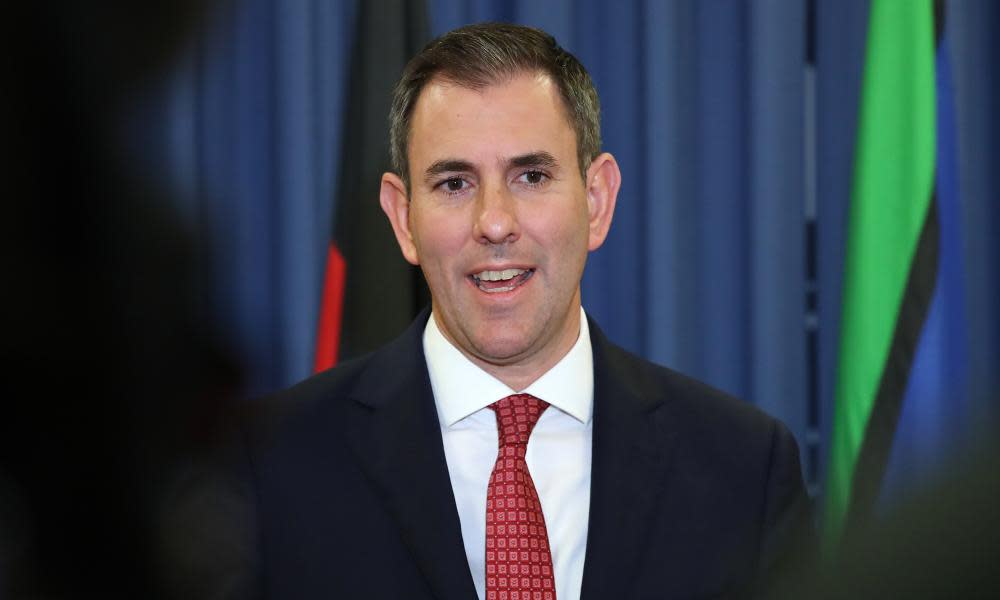Treasurer warns of ‘severity and magnitude of inflation challenge’ after RBA hikes official interest rate

The treasurer, Jim Chalmers, has described the Reserve Bank’s decision to hike the cash rate by 50 basis points as “difficult” news for homeowners, while warning that inflation will get worse before it gets better.
The prime minister, Anthony Albanese, who is in Indonesia, left the government’s response to the RBA’s higher-than-expected increase on Tuesday to his treasurer as he sought to revive a Keating-era tradition of not commenting on domestic issues while travelling overseas.
Following the RBA’s decision to lift the official cash rate to 0.85%, Chalmers said the government would pursue permanent cost of living relief in October’s budget, and would tackle the issue of stagnant wages growth to try to keep pace with inflation.
Related: Reserve Bank hikes official interest rate by 50 basis points to 0.85% to curb inflation
But he acknowledged that the rate hike – the highest single increase in more than 20 years – would hurt homeowners already grappling with “skyrocketing” cost of living pressures, and moved to assure Australians that there were better times ahead.
“The truth is that we have an incredibly difficult combination of challenges,” Chalmers said.
“High and rising inflation, rising interest rates, falling real wages at a time when our ability to respond to these challenges is constrained by the fact that the budget is absolutely heaving with Liberal debt,” he said.
“It is within our grasp, it is within our reach to strengthen our economy and have a better future, but first we need to navigate together this high and rising inflation and the interest rate rises that accompany it.”
Laying the blame for the cost of living crisis at the feet of the previous Coalition government, Chalmers said he wanted to be honest with the Australian people about the inflation challenge ahead, saying it “will get harder before it gets easier”.
“We need to be honest and upfront with the Australian people about the nature, the severity, the magnitude of this inflation challenge that we confront,” Chalmers said.
“This cost of living crisis has been brewing for the best part of a decade. It will take more than two and a half weeks to turn around.”
Pledging to do “what is necessary” to bring inflation down in line with the RBA’s target band of 2% to 3%, the Reserve Bank governor, Philip Lowe, said inflation had increased more than was expected a month ago, driven by global factors such as the war in Ukraine and Covid disruptions, along with domestic issues such as floods and capacity constraints.
Related: Markets turmoil and interest rate rises: the economic challenges facing Australia after the election
He said while the Australian economy was resilient, pointing to strong economic growth in the March quarter, there remained “uncertainty about the economic outlook” given the increasing pressure on household budgets from higher inflation.
Chalmers said his first budget, due in October, would assess the economic conditions at the time, but would include “permanent” cost of living relief through the government’s proposed changes to childcare, medicine costs and the energy market.
He also said that, unlike the previous government, which had been happy to allow wages to stagnate, Labor was committed to ensuring wages kept pace with inflation.
“I think Australians understand that they have just turfed a government who said that their deliberate design feature of the economic policy was to keep wages growth low and that was mission accomplished for the best part of a decade.”
Last week, Labor lodged its submission to the Fair Work Commission, calling for low-paid workers to receive a pay rise of at least 5.1% in line with inflation, rejecting suggestions it would lead to further inflationary pressure.
The submission noted “highly unusual and challenging economic conditions” in Australia and the 5.1% rate of inflation. It also noted the 2.7% gap between inflation and wages growth meant the average Australian was “experiencing the sharpest decline in real wages in 21 years”.
Chalmers said he did not believe a minimum wage increase would cause inflation to spiral as was argued by the Coalition during the election campaign.
“The reason we know that that is not inflationary of itself is because something like nine out of the last 10 Fair Work Commission decisions have been in with or on top of inflation,” he said.
“This is not the challenge that we have in the economy. The challenge we have had in the economy for the best part of a decade is stagnant wages and the fact that no matter how hard people work, they just can’t keep up with these rising costs of living.”
The opposition’s treasury spokesman, Angus Taylor, said that Labor had committed $45bn in off-budget spending and $18bn in on-budget spending that would exacerbate the inflationary pressures in the economy, despite the Coalition downplaying the impact of its pre-election budget spending when faced with the same criticism.
“This is the kind of unnecessary spending which increases interest rates, fuels inflation and makes life harder for Australians,” Taylor said.
“Within the context of government policy, the most important thing a government can do to contain interest rates and contain inflation is to contain spending.”

 Yahoo News
Yahoo News 
